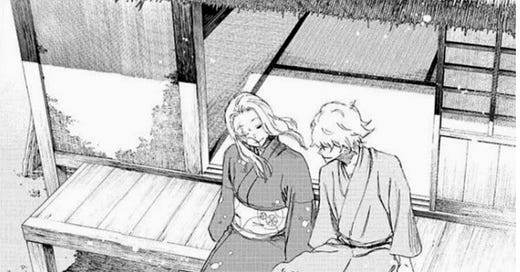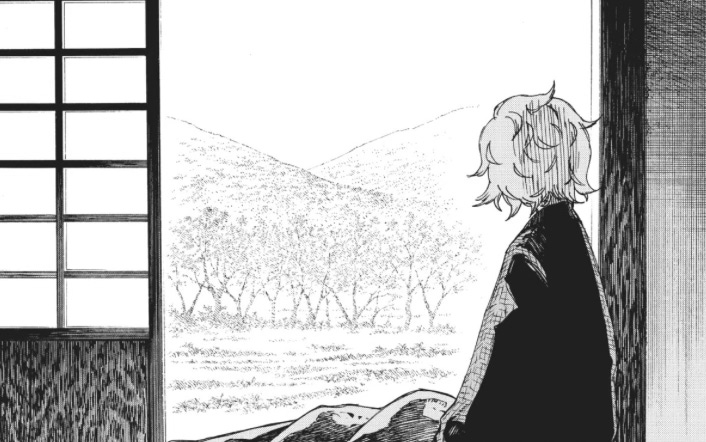Preface!
One of the reasons I encourage readers (yes, you) to drop comments and responses is because it’s through discussion that more storytelling concepts rise up and expand.
Case in point, this article. After I wrote the Attack on Titan piece, a friend and classmate (Hi Charles!) reached out to discuss the use of backstory and flashbacks, and that gave way to this revelation that, yet again, Hell’s Paradise did something pretty darn cool.
I mean, honestly, that realization happens every day, but still, it’s worth celebrating.
So, while I know I went pretty deep into flashbacks and backstories regarding Wind Breaker, stay with me on this more nuanced look at flashbacks and backstories, because it opens up a lot of fun.
Preface over.
I used to be obsessed with Christopher Nolan. Everything he did was coated in gold in my silly little eyes. What changed? Thanks for asking. I watched Inception one too many times. I think it was like… the 548th time. I crossed over and started to hate the movie.
And ever since, I’ve avoided him. I know, I’m missing out, but… just bear with me and my illogical agendas.
All that said, in the midst of my fawning over him, the movie Memento really stuck with me. Not even necessarily as a favorite film. Honestly, I can’t remember that much about it, which is ironic in its own right. I remember it because the plot device of a vacuous short-term memory made for a riveting case study for what backstory could look like.
I love it when stories play with memory, mostly because it’s so difficult to connect memory to the present as a storytelling element, let alone when memory is faulty. It allows you to really mess with readers, to string them along.
The other potential pitfall is just being too confusing.
But! And note, that’s an excited ‘but,’ what about when you start using the imperfect nature of memory in conjunction with backstory and flashbacks? That’s a whole world of potential. It’s like having another dimension of storytelling.
In case you haven’t noticed, I spend a lot of time thinking about flashbacks and backstories, because manga is like… 30% flashback and backstory. Sometimes more. I’ve made my opinions pretty clear that most backstory feels arbitrary. Let’s tell readers something about this character’s past that they may or may not care about. Maybe they’ll call it filler, maybe they won’t. I don’t want to go too deep down that rabbit hole, because I wrote about it in depth here:
But in thinking about flashbacks, I kept coming back to Hell’s Paradise, because it’s a rare series where I don’t skip or speed-read the flashbacks. And I settled on a pretty obvious reason as to why—the flashbacks in Hell’s Paradise are not presented as fact. They are presented as subjective, not objective. As the reader, you are presented with a version of the past that the present adventure regularly casts doubt on.
Meaning that what we’re seeing as a “flashback” may or may not be accurate. It’s like harnessing an unreliable narrator in past and present. Even as I write, I recall vividly how hooked I was in wanting to know if Gabimaru’s version of the past was real.
The lowdown of Gabimaru and his wife, Yui: Gabimaru’s flashbacks present this idealistic life he shared with a wife that he in no way deserved. He is, after all, a cold-blooded killer who feels no pain, and knows no fear. He is ruthless, through and through. His wife brought out a kindness and tenderness in him, something wholly opposite of what he initially presents as, and that’s what he’s fighting to get back to.
And that’s what you need to know.
The whole point is, those flashbacks being so ideal, juxtaposed with this horrid island Gabimaru is fighting through, nevermind his own reputation as a peerless assassin, presents a curious picture. These flashbacks raise more questions than they answer, and they add so much value to the present journey because we don’t really know if what Gabimaru is fighting for is real, or some fever dream from his cruel and brutal life.
Not being able to conclusively recognize what he’s fighting for makes it more complicated, as readers, to know what exactly we are rooting for. Is it best for him to die on this island, dreaming of this delusion that never was, or do we cling to hope that back in the real world, he has a loving wife that brings out the best in him? I know how it all turns out and I still feel conflicted.
As I think of the unpredictability of Gabimaru’s flashbacks, I recall again how few stories utilize such a narrative tool. First stop on my memory train is Demon Slayer. What really stuck with me from Demon Slayer is the way they retroactively venerate villains through flashbacks of the lives they lived, and how the world pushed them to their evil ways. Naturally though, these flashbacks are presented as clear fact, we have no reason to doubt their validity.
But what if we did?
Flashbacks also bring up the difficult question of perspective. Who’s perspective are we getting into to see this backstory? Very often—almost always, really—it’s the perspective of the character experiencing the flashback. For Gabimaru, it’s his own perspective. And the only reason doubt is placed on his flashbacks is because the present push of the story asks the question.
What if in Demon Slayer, the validity of the flashbacks from the demons was cast into doubt? Suddenly that veneration becomes not so straightforward and, dare I say, even more exciting.
The difference between the two uses of flashback can be summed up in one simple takeaway: Hell’s Paradise uses flashbacks to ask questions, Demon Slayer uses it to answer questions. And I’d say the gross majority of manga use it to answer questions, for that matter.
An example from a more mainstream source—Lord of the Rings. Following the (tragic and untimely) death of Boromir, the story essentially closes the loop on a flawed character. He was an easily corruptible man who would have succumbed to the power of the ring, surely, right? Good thing he died on a good note… right?
The Boromir loop reopens, posthumously, from Faramir’s perspective. In remembering his brother, Faramir thinks back on moments he shared with him outside of the context of the primary push of Lord of the Rings. We see the successes of Boromir as a captain of Gondor, we see his infallible morality, his dedication to good, how good of a brother he was, all the things we only saw glimpses of when he was with the Fellowship. He was good with the hobbits, he fought bravely, he died bravely. Those are all good things balanced out by his moments of temptation.
Altogether, he presents a bit morally ambiguous. Did his goodness begin to waiver the longer he held the forces of Mordor at bay, or was he always susceptible to power grabs? Hard to say.
Faramir’s flashback opens up Boromir’s character in new ways, expanding on what we thought we knew about him. Which is a fantastic use of flashback. Rather than close a loop or an arc or a whatever, it instead reopens one to make it more complex, more nuanced, and more thought-provoking. Now, in seeing his short-lived time in the Fellowship a second time, we can understand his weariness. All his life he’s been keeping Mordor at bay, by the blood of his people are your cities kept safe (that may or may not be a direct quote). Of course he’s going to be tempted by a weapon that could help him keep the free world free.
I must admit, I didn’t think that a Lord of the Rings example would work so well here, but I’m thrilled it did.
Maybe it’s just me, but having been through so many straightforward flashbacks and backstories, I began to slot them into indisputable fact. What we see is what happened, it informs the present characters, yeehaw. But the way Hell’s Paradise tinkers with reality opened up a whole new world of potential in making the past more engaging, never mind reshaping how we see the present.
As we all know, manga lives in the past, backstory is guaranteed (unless you’re my guy Sakura, from Wind Breaker) and any time that’s the case, it can start to feel formulaic. If this needs to be said, the last thing a story should ever be is formulaic.
Hey, creatives: Find a flashback in any story, or write a new one. Now let’s try to make it a bit… shakier. Try dropping hints in the past that what we’re seeing in the present isn’t all that it seems to be. For example, if you’re main character is talking to friend in the present, can we see a flashback of the two that directly contradicts what they’re talking about?
Hey, fans of Hell’s Paradise: Sad as it is to me, there are still online discourses that debate if Yui was real or not. Of course she’s real! Damnit. Forgive me, I came here to ask a question—do you think she’s real?








